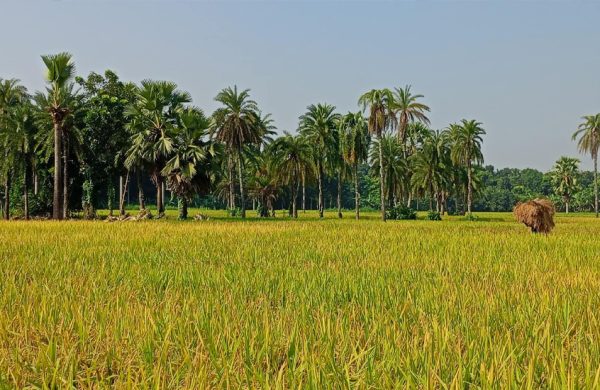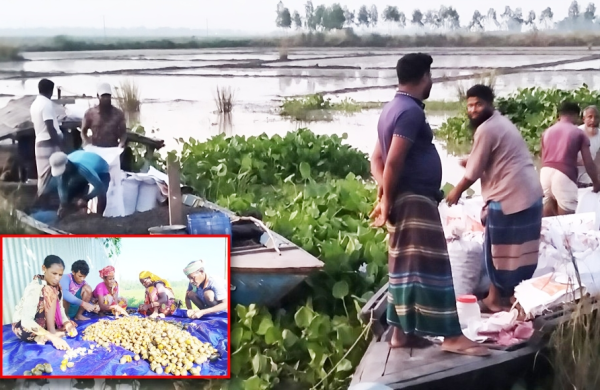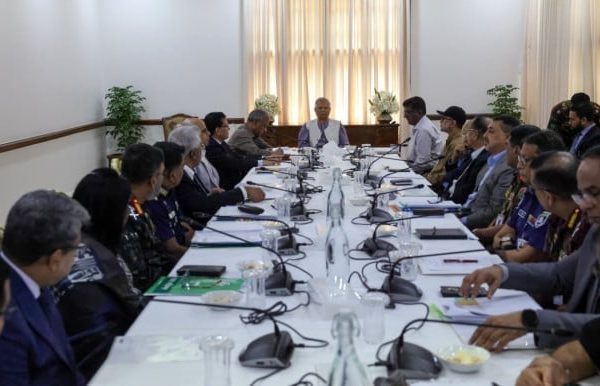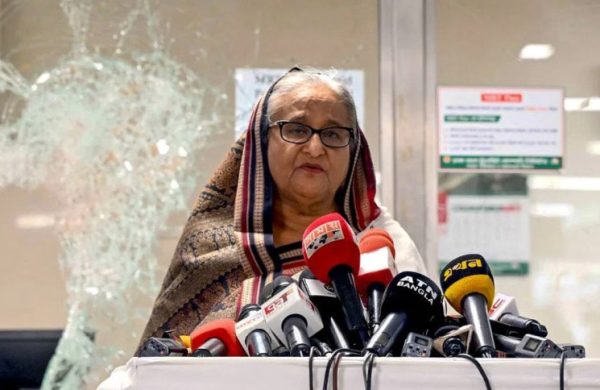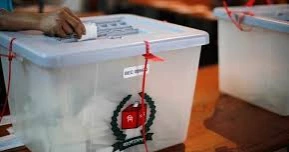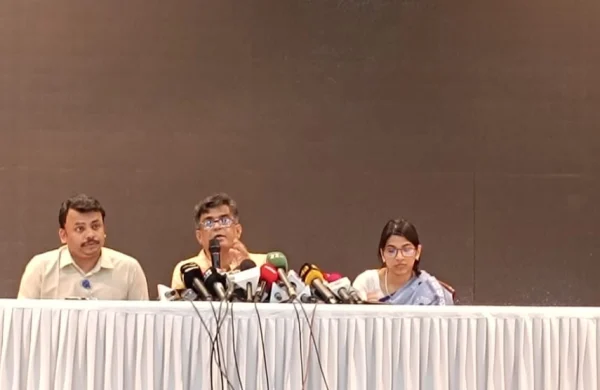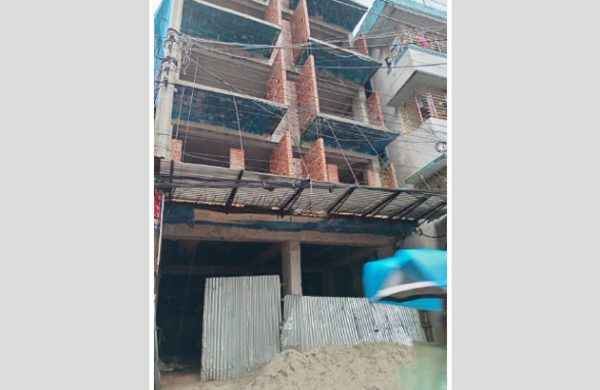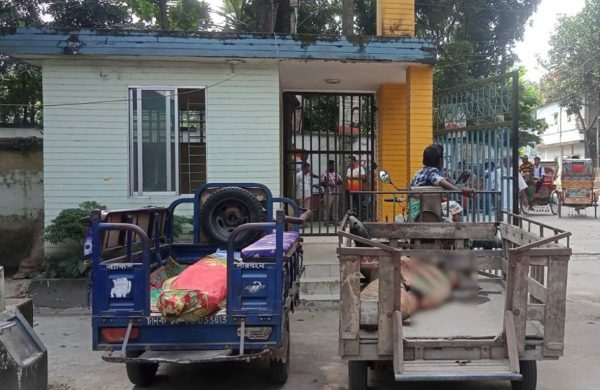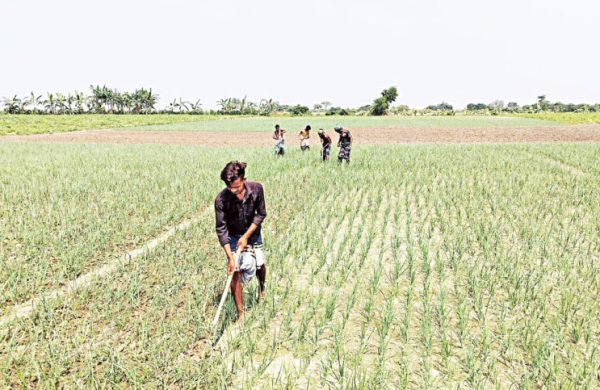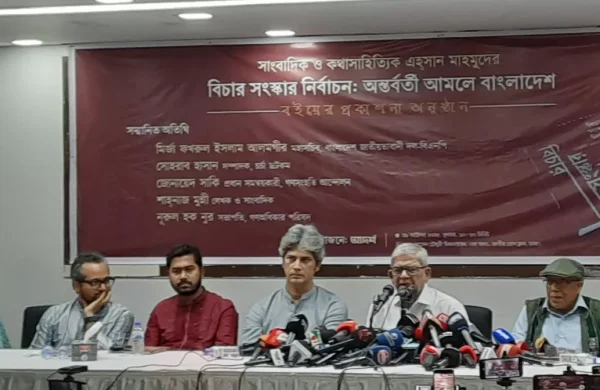Yunus, Modi discuss Hasina extradition, border, water issues in first-ever talks
- Update Time : Friday, April 4, 2025
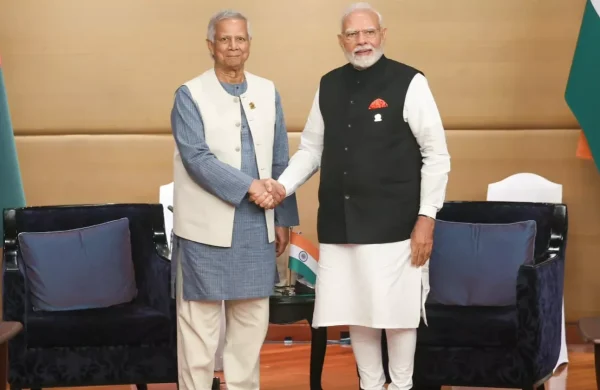
TDS Desk:
Chief Adviser Prof Muhammad Yunus on Friday (April 4) raised a number of issues, including deposed Prime Minister Sheikh Hasina’s extradition, water sharing of common rivers and border killings with Indian Prime Minister Narendra Modi during the much-talked-about bilateral meeting on the sidelines of the Bimstec Summit.
Chief Adviser’s Press Secretary Shafiqul Alam briefed reporters after the meeting.
“The 30-minute meeting was very constructive and fruitful as both leaders discussed all issues of mutual interest,” Alam said.
The issue of Sheikh Hasina’s provocative statements delivered from India was raised at the meeting, he said.
Besides, he said, fruitful discussions on border killings and Teesta River water sharing were also held.
The bilateral meeting on the sidelines of the Bimstec Summit is viewed as the most significant development in Dhaka-Delhi relations since the July Uprising in Bangladesh.
In a press statement issued later on the meeting, the press secretary said the leaders of these two major South Asian countries greeted each other with mutual respect and a shared openness for dialogue. Their 40-minute exchange was candid, productive, and constructive.
“Bangladesh deeply values its relationship with India,” said Professor Yunus. “The deep-rooted friendship between our two countries is founded on intertwined histories, geographical proximity, and cultural affinity. We remain thankful for the unwavering support of the government and people of India during our most challenging time in 1971.”
Although this was the first direct meeting between these two heads of government, Professor Yunus emphasised that the countries have remained engaged in numerous bilateral interactions over the past eight months.
Addressing the challenges facing the relationship between the two countries, Professor Yunus said, “Excellency, we seek to work together with you to set the relationship on the right track for the benefit of both our peoples.”
Professor Yunus, who assumed the chairmanship of Bimstec, sought the support of India for a Free Trade Agreement among the seven members of the group.
He called for discussions to renew the Ganges Water Treaty and to conclude the Teesta Water Sharing Agreement.
Prime Minister Narendra Modi congratulated Professor Yunus on his assumption of the Bimstec chairmanship, and he greeted him on the occasion of Eid-ul-Fitr.
The Indian prime minister said New Delhi has always attached “highest priority” to its relationship with Dhaka.
He said the history of the two neighbours is intricately linked, and it goes back to the birth of Bangladesh.
Modi also recalled the global stature of Prof Yunus. He said India would always support a progressive, democratic and inclusive Bangladesh.
He said India does not support any particular party in Bangladesh. “Our relationship is people-to-people.”
Professor Yunus enquired about the status of Bangladesh’s request for the extradition of Sheikh Hasina, the former Prime Minister of Bangladesh, which remains pending with the Indian government.
He noted that the former Bangladeshi prime minister had been making inflammatory remarks in various media outlets and attempting to destabilise the situation in Bangladesh, which seemed to be an abuse of the hospitality India has extended to her.
“She has consistently made false and inflammatory accusations against the interim government of Bangladesh,” Professor Yunus stated.
“We request that the Government of India take appropriate measures to restrain her from continuing to make such incendiary statements while she remains in your country.”
Professor Yunus also referenced the OHCHR’s Fact-Finding Report, which confirmed serious human rights violations and abuses committed by security forces and armed Awami League activists between July 15 and August 5, 2024.
He said the OHCHR report estimated that 1,400 protest-related deaths occurred, with approximately 13 per cent of the victims being children. He stated the report also found reasonable grounds to believe that crimes against humanity, such as murder, torture, and other inhumane acts, were committed during the protests.
The UN report notes that Hasina herself had ordered security forces to kill protesters and specifically instructed them to “arrest the ringleaders, kill them, and hide their bodies.”
Indian Prime Minister blamed social media for the tensions around Hasina’s remarks. He said India’s attachment is with a country, not with any individuals or political organisations.
Professor Yunus also raised the issue of border killings and stressed that working together to reduce the number of fatalities would not only save many families great anguish but would also help to build trust and confidence and to strengthen the relationship between India and Bangladesh.
“I always felt the pain when these killings happen,” the Bangladesh Chief Adviser said, urging India to find “ways and means” to prevent the incidents.
Prime Minister Modi said Indian border troops opened fire only in self-defence and the fatalities occurred in Indian territories. The two leaders stressed the need to work together on this issue.
Professor Yunus expressed optimism about Bangladesh’s chairmanship of BIMSTEC. He said Bangladesh aims to increase the visibility of BIMSTEC and hopes that the organisation will emerge as an effective and vibrant entity capable of fulfilling the aspirations of the people in the region by giving them an efficient route for exporting and importing goods around the world.
Responding to Prime Minister Modi’s concern over the condition of minorities in Bangladesh, the Chief Adviser said the reports of attacks on the minorities were hugely inflated and “the bulk of them were fake news”. He asked the Indian leader to send reporters to Bangladesh to investigate the alleged attacks themselves.
The Chief Adviser said he has instituted an effective system for monitoring every incident of religious and gender violence in the country, and his government was taking serious actions to stop any occurrence of such incidents.
Both leaders concluded their fruitful and honest dialogue by wishing each other good health and personal well-being and extended their best wishes for continued peace, progress, and prosperity for the people of both countries.
This was the first-ever in-person meeting between the two South Asian leaders since the formation of Bangladesh’s interim government last August 8, following the fall of the previous government three days earlier.
Bangladesh foreign adviser Md Tauhid Hossain, High Representative of Chief Adviser Dr. Khalilur Rahman, Indian foreign minister Subrahmanyam Jaishankar, national security adviser Ajit Doval were among present on the occasion.
This is the biggest India-Bangladesh diplomatic development since former Prime Minister Sheikh Hasina’s ouster, and subsequent flight to Delhi (where she remains), observers say.
Earlier, Bangladesh approached India through the diplomatic channel to arrange a meeting between Prof Yunus and Indian Prime Minister Modi on the sidelines of the Summit.
In his pre-departure statement from India, Modi said he will meet the leaders of the Bimstec countries to discuss ways for strengthening collaboration, keeping the interests of people in mind.
“I look forward to meeting the leaders of the Bimstec countries and engaging productively to further strengthen our collaboration with the interests of our people in mind,” Modi said as he began his visit to Thailand and Sri Lanka on Thursday.
Relations between the South Asian neighbours, which were robust under Hasina, have deteriorated since she fled the country in August in the face of massive student-led protests and sought shelter in India.
Public opinion in Bangladesh turned against India, in part, for its decision to provide sanctuary to Hasina. New Delhi has not responded to Dhaka’s request to send her home for trial.
India has repeatedly urged Bangladesh to protect its minority Hindus, saying they were being targeted in the Muslim-majority country since Yunus took charge. Dhaka says the violence has been exaggerated and is not a communal issue.
With longstanding cultural and business ties, the two nations share a 4,000 km (2,500 mile) border.


